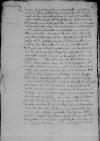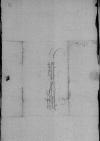Wie wir negst mit dem abent her gelangt in meynung uns koniglichem bevelh nach gem Elbing (Elbląg), city in northern Poland, Pomerania, on the Vistula Lagoon, one of the three Great Prussian Cities (beside Gdańsk (Danzig) and Thorn (Toruń)) which had representatives in the Prussian Council; member of the Hanseatic League⌊ElbingElbing (Elbląg), city in northern Poland, Pomerania, on the Vistula Lagoon, one of the three Great Prussian Cities (beside Gdańsk (Danzig) and Thorn (Toruń)) which had representatives in the Prussian Council; member of the Hanseatic League⌋ zubegeben, / haben wir Ewer E(rbarkei)t cf. Georg von BAYSEN (BAŻYŃSKI) to Ioannes DANTISCUS 1540-01-18 — 1540-02-27, CIDTC IDL 6806, letter lost⌊schreibencf. Georg von BAYSEN (BAŻYŃSKI) to Ioannes DANTISCUS 1540-01-18 — 1540-02-27, CIDTC IDL 6806, letter lost⌋ vor uns hie gefunden / in dem uns E(wer) E(rbarkei)t anzeigt, / wie von ferligkeit wegen der wesserungen mit der uberfart E(wer) E(rbarkei)t, auch aus derselbten woiwodschaft niemant vom adel und andern, dieweil sie Sigismund I Jagiellon (Zygmunt I) (*1467 – †1548), King of Poland and Grand Duke of Lithuania (1506-1548); Duke of Głogów (Glogau) (1499-1506), Duke of Opava (1501-1506), Governor of Silesia (1504-1506); son of King Kazimierz IV Jagiellon and Elisabeth of Austria⌊ko(niglich)e m(aieste)tSigismund I Jagiellon (Zygmunt I) (*1467 – †1548), King of Poland and Grand Duke of Lithuania (1506-1548); Duke of Głogów (Glogau) (1499-1506), Duke of Opava (1501-1506), Governor of Silesia (1504-1506); son of King Kazimierz IV Jagiellon and Elisabeth of Austria⌋, auch E(wer) E(rbarkei)t nicht gefurdert, / solcher tag auch den appellanten nicht kundt gethan, / uf den gelegten tag gem Elbing (Elbląg), city in northern Poland, Pomerania, on the Vistula Lagoon, one of the three Great Prussian Cities (beside Gdańsk (Danzig) and Thorn (Toruń)) which had representatives in the Prussian Council; member of the Hanseatic League⌊ElbingElbing (Elbląg), city in northern Poland, Pomerania, on the Vistula Lagoon, one of the three Great Prussian Cities (beside Gdańsk (Danzig) and Thorn (Toruń)) which had representatives in the Prussian Council; member of the Hanseatic League⌋ wirt kommen und vor das beste erkennet die zeit erstreckt wurde, / und auch uber alles zuvorstehen gibt, / wie der alte brauch mit der heissunge zur tagefart nicht gehalten, / das uns nicht angehet, dieweil es koniglicher m(aieste)t, u(nserm) a(llergnedigsten) hern, zugehorig etc. Wir thun uns aber klerlich erinnern, / das in beigewichnen tagen der edel, wolgeborn h(er) Achatius von Zehmen (Achacy Cema) (*ca. 1485 – †1565), 1517-1531 Chamberlain of Pomerania, 1531-1546 Castellan of Gdańsk (Danzig), 1545-1546 Voivode of Kulm (Chełmno), 1546-1565 Voivode of Marienburg (Malbork) (SBPN 1, p. 194-195; ORACKI 1984, p. 38-39; Urzędnicy 5/2, p. 198; PSB 4, p. 325-326)⌊dantzker castellanAchatius von Zehmen (Achacy Cema) (*ca. 1485 – †1565), 1517-1531 Chamberlain of Pomerania, 1531-1546 Castellan of Gdańsk (Danzig), 1545-1546 Voivode of Kulm (Chełmno), 1546-1565 Voivode of Marienburg (Malbork) (SBPN 1, p. 194-195; ORACKI 1984, p. 38-39; Urzędnicy 5/2, p. 198; PSB 4, p. 325-326)⌋ uns von E(wer) E(rbarkei)t und anderer herren wegen hat angeret, / das wir Sigismund I Jagiellon (Zygmunt I) (*1467 – †1548), King of Poland and Grand Duke of Lithuania (1506-1548); Duke of Głogów (Glogau) (1499-1506), Duke of Opava (1501-1506), Governor of Silesia (1504-1506); son of King Kazimierz IV Jagiellon and Elisabeth of Austria⌊ko(nigliche)r m(aieste)tSigismund I Jagiellon (Zygmunt I) (*1467 – †1548), King of Poland and Grand Duke of Lithuania (1506-1548); Duke of Głogów (Glogau) (1499-1506), Duke of Opava (1501-1506), Governor of Silesia (1504-1506); son of King Kazimierz IV Jagiellon and Elisabeth of Austria⌋ in der Council of Royal Prussia the most important local authority in Royal Prussia. It consisted of two bishops (of Ermland (Warmia), who served as the Council’s president, and of Kulm (Chełmno)), three voivodes (of Kulm, Marienburg (Malbork), and Pomerania), three castellans (of Kulm, Elbing (Elbląg), and Gdańsk (Danzig)), three chamberlains (of Kulm, Marienburg, and Pomerania), and representatives of the three Great Prussian Cities – Gdańsk, Thorn (Toruń), and Elbing (ACHREMCZYK 2016, p. 17-18)⌊herren retheCouncil of Royal Prussia the most important local authority in Royal Prussia. It consisted of two bishops (of Ermland (Warmia), who served as the Council’s president, and of Kulm (Chełmno)), three voivodes (of Kulm, Marienburg (Malbork), and Pomerania), three castellans (of Kulm, Elbing (Elbląg), and Gdańsk (Danzig)), three chamberlains (of Kulm, Marienburg, and Pomerania), and representatives of the three Great Prussian Cities – Gdańsk, Thorn (Toruń), and Elbing (ACHREMCZYK 2016, p. 17-18)⌋ nahmen solten schreiben unnd bitten, weil in zweyen jaren kein tagefart gehalten und vil sachen das gemeine land und sondere personen betreffende ufwuchssen, / das ir ko(niglich)e m(aieste)t die tagefart, welche uf Stanislai[1] gen Marienburg (Malbork), town and castle in northern Poland, Pomeranian Voivodeship, on the Nogat river, a branch of the Vistula at its delta, the capital of the Grand Masters of the Teutonic Order in Prussia (1309-1457), a voivodeship capital in Royal Prussia, which belonged to the Kingdom of Poland (1466-1772). Marienburg (taking turns with Graudenz (Grudziądz)) was the venue for the Provincial Diets of Royal Prussia, which were chaired by the bishop of Ermland (Warmia)⌊MarienburgMarienburg (Malbork), town and castle in northern Poland, Pomeranian Voivodeship, on the Nogat river, a branch of the Vistula at its delta, the capital of the Grand Masters of the Teutonic Order in Prussia (1309-1457), a voivodeship capital in Royal Prussia, which belonged to the Kingdom of Poland (1466-1772). Marienburg (taking turns with Graudenz (Grudziądz)) was the venue for the Provincial Diets of Royal Prussia, which were chaired by the bishop of Ermland (Warmia)⌋ bestimpt, wolte gen Elbing (Elbląg), city in northern Poland, Pomerania, on the Vistula Lagoon, one of the three Great Prussian Cities (beside Gdańsk (Danzig) and Thorn (Toruń)) which had representatives in the Prussian Council; member of the Hanseatic League⌊ElbingElbing (Elbląg), city in northern Poland, Pomerania, on the Vistula Lagoon, one of the three Great Prussian Cities (beside Gdańsk (Danzig) and Thorn (Toruń)) which had representatives in the Prussian Council; member of the Hanseatic League⌋ uf Oculi[2] vorlegen. / Uf solcher unser bitten ist es mit ytziger tagefart der gestalt gescheen. / Abs nu von notten wolde sein / zu allen stenden in sonderheit konigliche furderung, / so yeder weis, das die Council of Royal Prussia the most important local authority in Royal Prussia. It consisted of two bishops (of Ermland (Warmia), who served as the Council’s president, and of Kulm (Chełmno)), three voivodes (of Kulm, Marienburg (Malbork), and Pomerania), three castellans (of Kulm, Elbing (Elbląg), and Gdańsk (Danzig)), three chamberlains (of Kulm, Marienburg, and Pomerania), and representatives of the three Great Prussian Cities – Gdańsk, Thorn (Toruń), and Elbing (ACHREMCZYK 2016, p. 17-18)⌊herren retheCouncil of Royal Prussia the most important local authority in Royal Prussia. It consisted of two bishops (of Ermland (Warmia), who served as the Council’s president, and of Kulm (Chełmno)), three voivodes (of Kulm, Marienburg (Malbork), and Pomerania), three castellans (of Kulm, Elbing (Elbląg), and Gdańsk (Danzig)), three chamberlains (of Kulm, Marienburg, and Pomerania), and representatives of the three Great Prussian Cities – Gdańsk, Thorn (Toruń), and Elbing (ACHREMCZYK 2016, p. 17-18)⌋ zwir ym jare zusammen sollen kommen, lasse wir in seiner wirden. / Es ist uns nachm frischem gedancken, / das Elbing Town Council ⌊die vom ElbingElbing Town Council ⌋ sich uf die Provincial Diet of Royal Prussia ⌊tagfartProvincial Diet of Royal Prussia ⌋ vor drey ungeferlich jaren gen Graudenz (Grudziądz, Graudentium), city in Poland, Voivodeship of Pomerania, on the upper east bank of the Vistula, Graudenz (taking turns with Marienburg (Malbork)) was the venue for the Provincial Diet of Royal Prussia, which were chaired by the bishop of Ermland (Warmia)⌊GraudentzGraudenz (Grudziądz, Graudentium), city in Poland, Voivodeship of Pomerania, on the upper east bank of the Vistula, Graudenz (taking turns with Marienburg (Malbork)) was the venue for the Provincial Diet of Royal Prussia, which were chaired by the bishop of Ermland (Warmia)⌋ zukommen schriftlich entschuldigten derhalben, das sie nicht gefordert weren, / unnd worden schriftlich und  APG 300, 53, 267, p. 80 dornach von allen herren mundtlich hart dorumb bestossen. Wan aber Sigismund I Jagiellon (Zygmunt I) (*1467 – †1548), King of Poland and Grand Duke of Lithuania (1506-1548); Duke of Głogów (Glogau) (1499-1506), Duke of Opava (1501-1506), Governor of Silesia (1504-1506); son of King Kazimierz IV Jagiellon and Elisabeth of Austria⌊kö(nigliche) m(aieste)tSigismund I Jagiellon (Zygmunt I) (*1467 – †1548), King of Poland and Grand Duke of Lithuania (1506-1548); Duke of Głogów (Glogau) (1499-1506), Duke of Opava (1501-1506), Governor of Silesia (1504-1506); son of King Kazimierz IV Jagiellon and Elisabeth of Austria⌋ in iren gescheften aus den zweyen zeitten tagferte ansetzen, / als dan werden sondere allen stenden furdere brieff geschickt. / Dis mal ins landts handlungen ists den herren woiwoden befolhen, dorzu wir superinscribed in place of crossed-out ich⌈ich wir wir superinscribed in place of crossed-out ich⌉ bisher unbeschwert gekommen / und ist uns superinscribed⌈unsuns superinscribed⌉ unser bekuemigheit nach / nicht weniger lieb also E(wer) E(rbarkei)t, das diese adscribed⌈sese adscribed⌉ tageleistung vorblieben, der wir langwerige gesuntheit und alle wolfart von Got dem almechtigen wunschen und bitten.
APG 300, 53, 267, p. 80 dornach von allen herren mundtlich hart dorumb bestossen. Wan aber Sigismund I Jagiellon (Zygmunt I) (*1467 – †1548), King of Poland and Grand Duke of Lithuania (1506-1548); Duke of Głogów (Glogau) (1499-1506), Duke of Opava (1501-1506), Governor of Silesia (1504-1506); son of King Kazimierz IV Jagiellon and Elisabeth of Austria⌊kö(nigliche) m(aieste)tSigismund I Jagiellon (Zygmunt I) (*1467 – †1548), King of Poland and Grand Duke of Lithuania (1506-1548); Duke of Głogów (Glogau) (1499-1506), Duke of Opava (1501-1506), Governor of Silesia (1504-1506); son of King Kazimierz IV Jagiellon and Elisabeth of Austria⌋ in iren gescheften aus den zweyen zeitten tagferte ansetzen, / als dan werden sondere allen stenden furdere brieff geschickt. / Dis mal ins landts handlungen ists den herren woiwoden befolhen, dorzu wir superinscribed in place of crossed-out ich⌈ich wir wir superinscribed in place of crossed-out ich⌉ bisher unbeschwert gekommen / und ist uns superinscribed⌈unsuns superinscribed⌉ unser bekuemigheit nach / nicht weniger lieb also E(wer) E(rbarkei)t, das diese adscribed⌈sese adscribed⌉ tageleistung vorblieben, der wir langwerige gesuntheit und alle wolfart von Got dem almechtigen wunschen und bitten.
 APG 300, 53, 267, p. 80 dornach von allen herren mundtlich hart dorumb bestossen. Wan aber
APG 300, 53, 267, p. 80 dornach von allen herren mundtlich hart dorumb bestossen. Wan aber 

